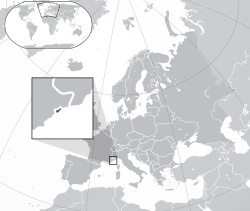Municipality of Monaco
Municipality of Monaco | |
|---|---|
 Town hall of the Municipality of Monaco | |
 | |
| Coordinates: 43°43′52.48″N 7°25′11.08″E / 43.7312444°N 7.4197444°E | |
| Country | |
| Government | |
| • Type | Principality |
| • Prince | Albert II |
| • Mayor | Georges Marsan |
| Area | |
| • Land | 2 km2 (0.8 sq mi) |
| Elevation | 10 m (30 ft) |
| Population | |
• Total | 32,020 |
| Postcode | 98000 |
The Municipality of Monaco (French: Commune de Monaco; Monégasque: Cumüna de Mùnegu) is the only administrative division of the Principality of Monaco, and is coterminous with the state as a whole. It borders France.
Political order
The municipal system is determined by the IX part of the Constitution of Monaco. The Municipality of Monaco has as its organ the city council made up of 15 members, who can also be present at the National Council. A little more than 7,000 Monegasque citizens are voters, while to be elected it is necessary to be 21 years old. The electoral system is a simple two-year plurinominal scrutiny: each elector has fifteen votes of preference that he can distribute to his pleasure among the possibly competing lists.[2] The candidates who have been chosen by more than half of the voters are elected in the first round, while for the others the road of a second round is opened in which the most voted candidates are elected.[3] The effect of this mechanism is hyper-major, configuring an assembly dominated by the first party of the principality, the Union Monégasque. The term of office is 4 years.
The council elects in its interior the mayor and his deputies, or the councilors. The political custom, however, makes sure that the candidate for the first city armchair is indirectly indicated by the voters in the figure of the list leader of the most voted list. The current mayor is Georges Marsan, who has been in office since 2003 and has come to the third re-election.[4]
The functions of the municipality, active in social, cultural and civil life, do not differ substantially from those of the homologous bodies of neighboring nations, the French and Italian municipalities.[5]
History
The ancient territory of the Principality was much larger than the present one, including also the towns of Roccabruna and Menton which, however, arose in the framework of the Italian Risorgimento, passed to France in 1860 leaving the capital, i.e. the Monegasque municipality, as the only commune of the State.
The 1911 constitution divided the old Commune of Monaco into the three municipalities — Monaco City, Monte Carlo and La Condamine — but the prince's government was accused of weakening one of the only democratic institutions in the country; at the time the National Council had extremely limited powers. Because of the controversy, the unified municipality was restored in a 1917 law which took effect the following year. Since then, Monegasque territory has been administratively undivided, and the city districts have only had statistical purposes.
Today, the city hall of Monaco is based in place de la Mairie.
Quarters
| Ward | Area (km2) |
Population (Census of 2008) |
Density (km2) |
City Blocks (îlots) |
Remarks | |
|---|---|---|---|---|---|---|
| Former municipality of Monaco | ||||||
| Monaco-Ville | 0.19 | 1,034 | 5,442 | 19 | Old City | |
| Former municipality of Monte Carlo | ||||||
| Monte Carlo/Spélugues (Bd. Des Moulins-Av. de la Madone) | 0.30 | 3,834 | 12,780 | 20 | Casino and resort area | |
| La Rousse/Saint Roman (Annonciade-Château Périgord) | 0.13 | 3,223 | 24,792 | 17 | Northeast area, includes Le Ténao | |
| Larvotto/Bas Moulins (Larvotto-Bd Psse Grace) | 0.34 | 5,443 | 16,009 | 17 | Eastern beach area | |
| Saint Michel (Psse Charlotte-Park Palace) | 0.16 | 3,907 | 24,419 | 24 | Central residential area | |
| Former municipality of La Condamine | ||||||
| La Condamine | 0.28 | 3,947 | 14,096 | 28 | Northwest port area | |
| La Colle (Plati-Pasteur-Bd Charles III) | 0.11 | 2,829 | 25,718 | 15 | On the western border with Cap d'Ail | |
| Les Révoires (Hector Otto-Honoré Labande) | 0.09 | 2,545 | 28,278 | 11 | Contains the Jardin Exotique de Monaco | |
| Moneghetti/Bd de Belgique (Bd Rainier III-Bd de Belgique) | 0.10 | 3,003 | 30,030 | 17 | Central-north residential area | |
| New land reclaimed from the sea | ||||||
| Fontvieille | 0.35 | 3,901 | 11,146 | 10 | Started 1981 | |
| Monaco[6] | 2.05 | 33,666 | 16,422 | 178 | ||
| (1) Not included in the total, as it is only proposed | ||||||
Twin towns and sister cities
The Municipality of Monaco is twinned with:[7]
 Ostend, Belgium (1958)
Ostend, Belgium (1958) Lucciana, France (2009)
Lucciana, France (2009) Dolceacqua, Italy (2023)
Dolceacqua, Italy (2023)
References
- ^ "Bollettino Ufficiale del Principato". Archived from the original on July 9, 2011.
- ^ Nicematin
- ^ "Monacohebdo". Archived from the original on 2013-05-10. Retrieved 2017-12-05.
- ^ Monaco, Mairie de; Monaco, La Mairie de. "Les élus - Site officiel de la Mairie de Monaco". La Mairie de Monaco.
- ^ Monaco, Mairie de; Monaco, La Mairie de. "Introduction - Mairie de Monaco - Site officiel de la Mairie de Monaco". La Mairie de Monaco.
- ^ "Monaco Statistiques Pocket" (in French). Gouv.mc. Retrieved 6 September 2012.
- ^ "Jumelages" (in French). Town Hall of Monaco. Retrieved 2024-01-13.


